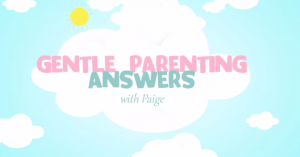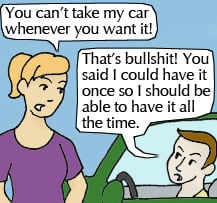
Source: Role Reboot
Originally published on Role/Reboot and cross-posted here with their permission.
I’m on an arbitrary crosswalk on an arbitrary Sunday in Chicago when it happens.
He’s in his early 40’s, nicely dressed. As we head in opposite directions, elbows almost bumping, he leans into my space, face inches from mine and hisses, “Fuck you, bitch.”
He keeps walking, and I stop dead in the middle of the street, hoping someone else just saw that.
It’s the “bitch” that kept swinging through the revolving door in my brain as I walked the half mile home.
Why did he call me that? I didn’t do anything to him, I didn’t say anything to him, I didn’t even look at him. Was I supposed to smile?
A random “fuck you” might just be the standard cost of living in a large city where you encounter the occasional unstable citizen, but the “bitch” added insult to injury.
I take “bitch” more seriously than other insults because it attempts to use a piece of my identity – my femaleness – as a weapon, and consequently feels more personal.
It’s the difference between “Fuck you!” and “Fuck you, and you’re a woman too!”
Epithets that have that identity-bashing twist reinforce the underlying assumption that to be eligible for a particular label makes you extra worthy of humiliation.
Consider this: If you were to attempt to denigrate someone without calling on an identity-based insult, what are your choices?
“Jerk” doesn’t feel particularly powerful, does it? To really drive home your anger or frustration, you need something that really matters, something with some oomph, something to hit ‘em where it hurts.
When you insult someone, your goal is to hurt, shame, undermine, or humiliate. Your goal is destruction, in some small form, of self-esteem or ego. Cut them down to size. Knock them down a few pegs. Remind them where they really belong. You need an identity tag.
It is no surprise that the big three wash-your-mouth-out-with-soap insults, the N-word (to describe Black people), the F-word (to describe gay people), and the C-word (to describe women) are identity-insults.
(Note, I’m not suggesting that these words are of equal weight; they are used with different intensity, frequency, and come with differing historical contexts, only that they do share some characteristics.)
In recent history, all three have been the subject of reclamation projects (like this recent effort from The Gloss) by their respective groups. We can make the case, as many constituencies have, that there is value in re-appropriating these words and restoring ownership of them and their meaning to their rightful badge-wearers.
In many instances, I agree with these movements.
That said, when these words are spewed as insults (as the C-word recently was by Anthony Weiner’s campaign manager), it is not about cultural reclamation or appreciation of heritage.
It is an effort to play on good old-fashioned ‘isms and ‘phobia and make someone feel small by calling out something that you thinks makes him or her less than.
Bitch, though not considered one of the true un-utterables, belongs in this identity-jab bucket, too.
What does it even mean? I Urban-Dictionary’d it, and as one might expect, found “someone who whines excessively,” “annoying and whining female,” “a person who performs tasks for another, usually degrading in status,” a “woman with a bad attitude.”
Colloquially, this term has come to mean that you are the owner of the “wrong” attitude.
“Bitch” is about not fitting the mold that women are supposed to fit. It is aimed at women who behave in “male” ways, women who are too ambitious or aggressive, women who are not as nice or as quiet as some people would like them to be.
Back in 2012 during Michelle Bachmann’s surprising rise to popularity, Jimmy Fallon invited her on his late night show. His house band The Roots played a little joke and performed an instrumental cover of Fishbone’s “Lying Ass Bitch” as she walked on stage. (The song is about a woman who cheats on her boyfriend.)
At the time, I felt as if nothing short of the apocalypse would compel me to defend Bachmann, but it turned out all I needed was the word “bitch” to float to the top of the criticism pile and there I was, momentarily on Team Bachmann.
There are millions of statements we could make about her that would be insulting and true. She is ignorant. She is bigoted. She is uninformed. She is hypocritical. She is inarticulate. Why do we have to go with “bitch?”
Would we ever play that behind Rick Perry? Hell no, because he does not have the liability of being a pain in the ass and having a vagina. From the Roots, the diss was clear, “You’re a liar (and a woman!).”
Reclamation projects aside – think Bitch magazine – we all need to carefully consider when and why we take aim with a B-bomb.
That woman in our office that we don’t like, why don’t we like her? Is she rude? Is she arrogant? Is she loud?
Before we start whispering at the water cooler about what a bitch she is, it’s worth a minute to ponder what we’d say of a man behaving the same way.
Obnoxious is as obnoxious does, but we don’t expect men to be polite (though we all should be), and we don’t expect them to be self-deprecating or meek. Are we punishing her for her annoying behavior, or are we punishing her because she’s annoying and female?
How we signal our displeasure to someone matters, because it is in our attempts to cause harm that we reveal how we really feel about who they are.
We use the words we think will hurt the most, and in doing so, expose our prejudice.
[do_widget id=”text-101″]
Role/Reboot regular contributor Emily Heist Moss is a New Englander in love with Chicago, where she works in a tech start-up. She blogs every day about gender, media, politics and sex at Rosie Says, and has written for Jezebel, The Frisky, The Huffington Post and The Good Men Project. Find her on Facebook and Twitter.
Search our 3000+ articles!
Read our articles about:
Our online racial justice training
Used by hundreds of universities, non-profits, and businesses.
Click to learn more




















